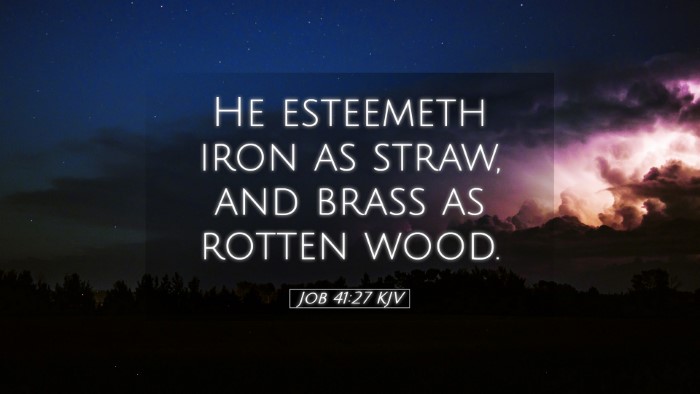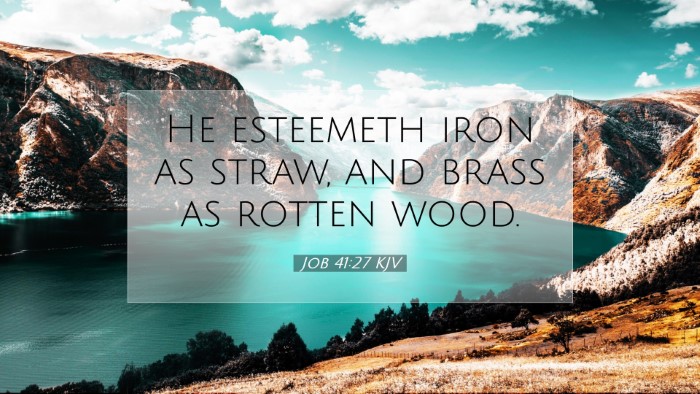Commentary on Job 41:27
The verse Job 41:27 states: "He counts iron as straw, and bronze as rotten wood." This passage comes from God's discourse regarding the Leviathan, a creature that symbolizes chaos, power, and possibly a representation of Satan or formidable forces in the world.
Introduction
This commentary seeks to explore the depth of this scripture as illuminated by various public domain sources, aiming to provide insight valuable to pastors, students, theologians, and Bible scholars. The verse presents profound theological implications regarding God’s omnipotence and the nature of creation in contrast to human understanding and strength.
1. Exegesis and Context
In the wider context of Job, the Book addresses profound suffering and the question of divine justice. In chapter 41, God, in response to Job, showcases His creation—the Leviathan—emphasizing its power and the futility of human attempts to dominate it. The mention of materials such as iron and bronze serves to illustrate the creature’s indestructibility in comparison to the human perspective of strength.
2. Insights from Matthew Henry
Matthew Henry focuses on the dominance and untouchable nature of the Leviathan:
- Symbol of Strength: He highlights that "iron" and "bronze" symbolize the pinnacle of human industry and strength, yet are made trivial by God’s creation.
- Divine Supremacy: Henry notes that God uses the Leviathan to demonstrate His absolute sovereignty. What man considers valuable, God says is as insignificant as “straw” and “rotten wood.”
- Human Limitations: This serves to reveal the limitations of human power and resources when placed against God’s creation and authority.
3. Perspectives from Albert Barnes
Barnes offers a theological reflection on the nature of creatures compared to God:
- Contrast of Material Value: He emphasizes that the assertion that iron is like straw reveals how God views worldly materials in light of His might and the creations He governs.
- Encouragement for Believers: This perspective encourages believers to refrain from overestimating their own capabilities and procure humility before the Creator.
- Nature’s Reflection of God’s Might: The grandeur of the Leviathan reflects God’s eternal power, illustrating that all creation serves a purpose under divine providence.
4. Commentary by Adam Clarke
Clarke delves into the implications of the metaphorical language in this passage:
- Metaphorical Significance: Clarke notes that the description of iron as “straw” highlights the distortion in perception between God's perspective and ours.
- Challenge to Human Wisdom: He suggests that these metaphors challenge the wisdom and reasoning of mankind, calling them to a recognition of their place in creation.
- Divine Authority over Chaos: Clarke sees the Leviathan as a representation of chaos and disorder, suggesting that God’s control over such entities reassures believers of His sovereign will.
5. Theological Implications
This verse holds significant implications for understanding God’s nature and His relationship with creation:
- God’s Omnipotence: The comparison illustrates God’s role as the ultimate authority over all creatures, which should comfort believers in their trials.
- Human Misunderstanding: It reminds humanity of its tendency to misjudge the significance of creation and its reliance upon earthly tools and weapons for strength.
- A Call to Trust: Believers are encouraged to trust in God’s provision and governance rather than their own strength or understanding.
6. Application for Pastors and Leaders
This commentary offers several applications for spiritual leaders:
- Preaching Perspective: Pastors can utilize this verse to illustrate God's majesty and the insignificance of earthly powers when set against divine sovereignty.
- Encouraging Faith: Leaders might encourage congregants to lean on God’s strength during times of distress, using this verse to bolster faith in God’s ultimate dominion.
- Reflections on Human Limits: Sermons can explore the theme of human limitations and divine power, prompting congregants to reflect on their dependency on God.
Conclusion
Job 41:27 serves as a profound reminder of God’s sovereignty and the futility of human pride. In the context of a powerful creation like the Leviathan, this verse calls believers to recognize the limitations of their own strength and trust wholly in the omnipotent Creator. Through the insights of Matthew Henry, Albert Barnes, and Adam Clarke, we gain a layered understanding of this text, encouraging deeper theological reflection and application in our lives as followers of Christ.


